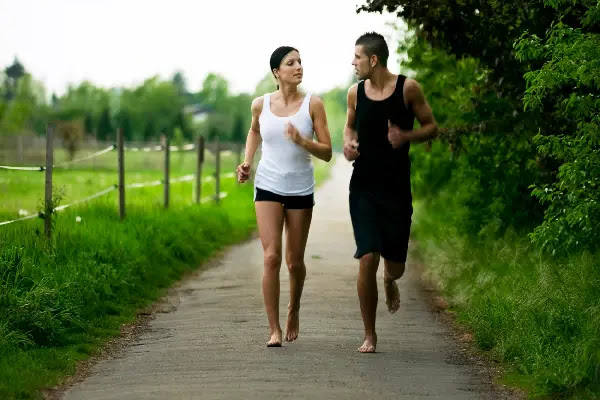Featured
- Get link
- X
- Other Apps
the benefits of walking and jogging barefoot
The humble act of outdoor barefoot offers many benefits that are unfortunately often overlooked.
Man is a barefoot runner. Our ancestors wrapped furs around their feet just for protection, from which shoes changed over time.
As we walk, our intrinsic foot, lower limb, and core muscles must maintain a degree of contraction to create tightness in the muscles and fasciae of our legs and essential to captivate the impact forces that occur whenever a foot hits the ground.
This tensioning mechanism is triggered in a healthy foot when sensory nerves in our feet are stimulated. These mainly respond to vibrations that come off the ground with every step. However, after wearing shoes for a lifetime, these nerves no longer react so that the impact forces are not dampened but are captivated by our joints, bones, and tendons. This has led to sweeping plantar fasciitis, Achilles tendon disease, and stress fractures.
What are the health benefits of walking without shoes?
When walking with rigid soles underfoot, you tend to place your foot flat on your heel, and the muscles of your forefoot and metatarsus are barely challenged. On the other hand, when walking barefoot, the front part of the foot helps to slow down the impact, which puts less strain on the joints from the toe, ankles, knees, and hips to the back.
By walking barefoot, which trains the feet' supporting muscles, the symptoms associated with a falling arch, also called pes planus, can be alleviated. The tension in the claw toes caused by frequent wearing of oversized shoes can also be relieved by walking without shoes.
In addition to many advantages, especially for the feet, there are also advantages for full-body statics: Even low heels change the gait and can have harmful effects on the musculoskeletal system, which exacerbate muscle overuse can lead to problems in the lower back.
Walking barefoot offers a whole new body feeling; foot reflex zones are stimulated, which benefits the entire body. Over time, the foot and the entire body become more agile and flexible.
How do you practice walking or running barefoot?
Running, or even walking barefoot, is only healthy if the foot muscles are trained and prepared (remember that each foot contains 26 bones - a quarter of all bones in the body - with 33 joints and over 100 muscles and tendons). It means that the foot muscles, like other muscles, have to be built up slowly to fulfill their function. Otherwise, you can get not only sore muscles but also permanent misalignments.
To awaken the sensory nerves in your feet, try walking barefoot at home as often as possible, preferably on uneven surfaces, and use golf balls or spiked balls under your tops to roll them out.
The key is to twitch slowly and finish the sensory awakening and foot training logs before starting to walk barefoot or in understated footwear. Running in minimalist shoes is the result of much preparation and, for some people, may not be advisable at all.
If you currently wear orthotics or suffer from ankle or
ankle pain, you should seek advice and help from a professional to help you
achieve your goals. But in the meantime, everyone can take off their shoes and
socks, massage their tired feet and try a short foot exercise.
Use the summer to walk barefoot on the beach:
Sand provides fighting, so walking requires more energy
while strengthening muscles between the feet and back, especially in the legs
and buttocks. Your foot will go through its full range of motion, and each time
your foot sinks into the sand, your muscles will have to work extra hard to
push you back up and move you forward.
- Get link
- X
- Other Apps
Popular Posts
increase your money while obtaining a life insurance policy
- Get link
- X
- Other Apps


